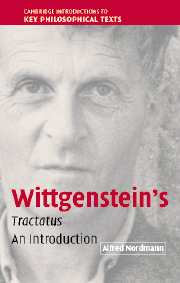Book contents
- Frontmatter
- Contents
- Preface
- List of abbreviations of works by Wittgenstein
- Introduction: Wittgenstein's provocation
- 1 Critical philosophy
- 2 The argument
- 3 Thought experiments
- 4 Tense and mood
- 5 The senses of sense
- Conclusion: a sense of familiarity
- References
- Index of names and subjects
- Index of passages
4 - Tense and mood
Published online by Cambridge University Press: 03 February 2010
- Frontmatter
- Contents
- Preface
- List of abbreviations of works by Wittgenstein
- Introduction: Wittgenstein's provocation
- 1 Critical philosophy
- 2 The argument
- 3 Thought experiments
- 4 Tense and mood
- 5 The senses of sense
- Conclusion: a sense of familiarity
- References
- Index of names and subjects
- Index of passages
Summary
The previous two chapters have adopted very different perspectives on the Tractatus. Chapter 2 took the global view by reconstructing its overarching philosophical thought experiment, the reductio ad absurdum. Chapter 3 treated each remark as a thought experiment on its own, the aphorism, as a miniature of the whole. And while chapter 2 focused on the logic of Wittgenstein's argument, chapter 3 looked at its “strictly philosophical and simultaneously literary” form of presentation. As they stand, each perspective represents one of the two aspects that were identified by Wittgenstein as making up the value of his book:
If this work has a value it consists in two things. First [chapter 3] that in it thoughts are expressed, and this value will be the greater the better the thoughts are expressed. The more the nail has been hit on the head …
On the other hand [chapter 2] the truth of the thoughts communicated here seems to me unassailable and definitive. I am therefore of the opinion that the problems have in essentials been finally solved. And if I am not mistaken in this, then the value of this work secondly consists in that it shows how little has been achieved when these problems are solved.
(TLP preface)Are we really to believe, however, that these two aspects are quite unrelated to one another, or might there exist between them a kind of interdependence? Wittgenstein suggests the latter by writing of a single value that consists in two things.
- Type
- Chapter
- Information
- Wittgenstein's TractatusAn Introduction, pp. 126 - 158Publisher: Cambridge University PressPrint publication year: 2005

